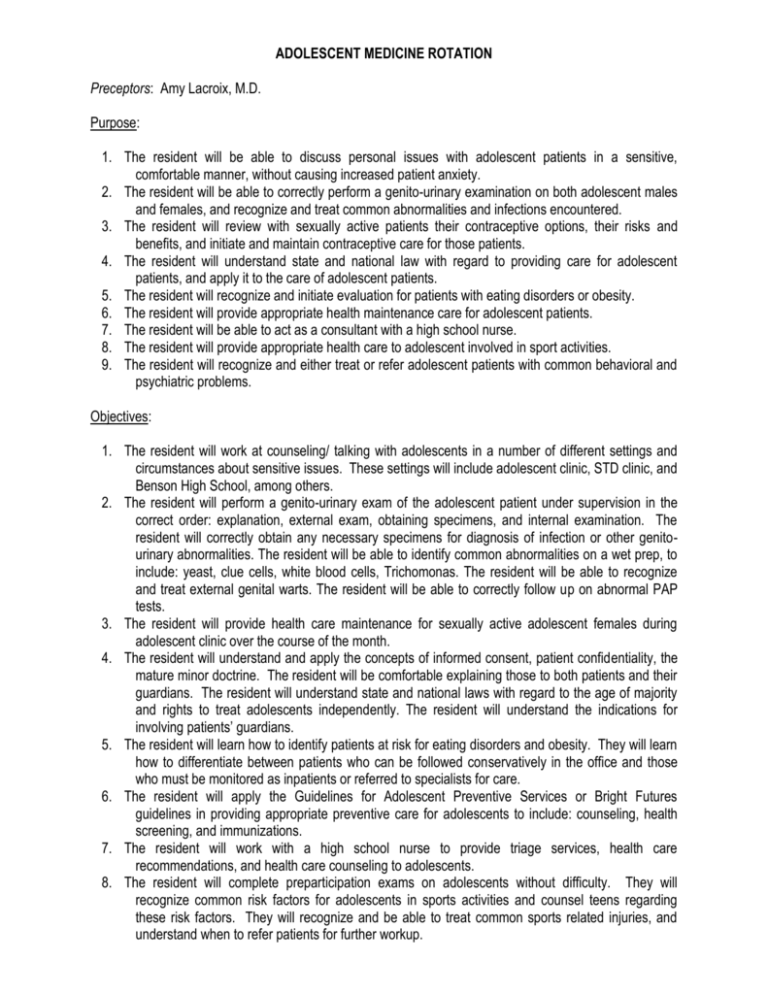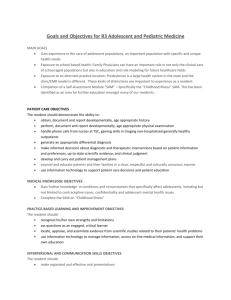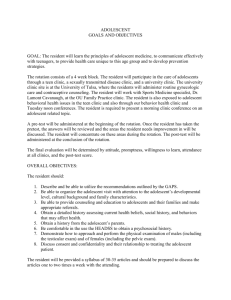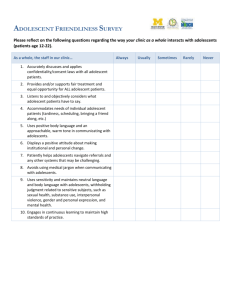ADOLESCENT MEDICINE ROTATION
advertisement

ADOLESCENT MEDICINE ROTATION Preceptors: Amy Lacroix, M.D. Purpose: 1. The resident will be able to discuss personal issues with adolescent patients in a sensitive, comfortable manner, without causing increased patient anxiety. 2. The resident will be able to correctly perform a genito-urinary examination on both adolescent males and females, and recognize and treat common abnormalities and infections encountered. 3. The resident will review with sexually active patients their contraceptive options, their risks and benefits, and initiate and maintain contraceptive care for those patients. 4. The resident will understand state and national law with regard to providing care for adolescent patients, and apply it to the care of adolescent patients. 5. The resident will recognize and initiate evaluation for patients with eating disorders or obesity. 6. The resident will provide appropriate health maintenance care for adolescent patients. 7. The resident will be able to act as a consultant with a high school nurse. 8. The resident will provide appropriate health care to adolescent involved in sport activities. 9. The resident will recognize and either treat or refer adolescent patients with common behavioral and psychiatric problems. Objectives: 1. The resident will work at counseling/ talking with adolescents in a number of different settings and circumstances about sensitive issues. These settings will include adolescent clinic, STD clinic, and Benson High School, among others. 2. The resident will perform a genito-urinary exam of the adolescent patient under supervision in the correct order: explanation, external exam, obtaining specimens, and internal examination. The resident will correctly obtain any necessary specimens for diagnosis of infection or other genitourinary abnormalities. The resident will be able to identify common abnormalities on a wet prep, to include: yeast, clue cells, white blood cells, Trichomonas. The resident will be able to recognize and treat external genital warts. The resident will be able to correctly follow up on abnormal PAP tests. 3. The resident will provide health care maintenance for sexually active adolescent females during adolescent clinic over the course of the month. 4. The resident will understand and apply the concepts of informed consent, patient confidentiality, the mature minor doctrine. The resident will be comfortable explaining those to both patients and their guardians. The resident will understand state and national laws with regard to the age of majority and rights to treat adolescents independently. The resident will understand the indications for involving patients’ guardians. 5. The resident will learn how to identify patients at risk for eating disorders and obesity. They will learn how to differentiate between patients who can be followed conservatively in the office and those who must be monitored as inpatients or referred to specialists for care. 6. The resident will apply the Guidelines for Adolescent Preventive Services or Bright Futures guidelines in providing appropriate preventive care for adolescents to include: counseling, health screening, and immunizations. 7. The resident will work with a high school nurse to provide triage services, health care recommendations, and health care counseling to adolescents. 8. The resident will complete preparticipation exams on adolescents without difficulty. They will recognize common risk factors for adolescents in sports activities and counsel teens regarding these risk factors. They will recognize and be able to treat common sports related injuries, and understand when to refer patients for further workup. 9. The adolescent resident will understand common presentation of adolescent patients with depression, anxiety, attentional problems, and psychosis, as well as drug use and abuse. They will initiate appropriate treatment for these conditions, and refer patients to other resources when appropriate. Methods: 1. The resident will interview adolescent patients about concerns with regard to developmental changes, sexual behaviors, depression, violence, and family issues. 2. The resident will perform at least 10 examinations on both male and female patients during the month. Many of these will be under direct supervision by Pediatric staff. The resident will assist staff with diagnosis of abnormal wet preps on female patients. The resident will review the 1998 STD protocols from the CDC and will review STD symptoms in the STD atlas. 3. The resident will work with pediatric staff in providing contraceptive management to patients in adolescent clinic over the month. 4. The resident will review the pretest with Dr. Lacroix during the first week of the rotation. 5. The resident will observe patients going through initial evaluation for eating disorder and obesity in both Eating Disorder Clinic and Adolescent Clinic. They will observe Dr. Marty Harrington in his psychiatric management of adolescent and adult patients with eating disorders and their comorbidities. 6. The resident will review the AMA’s Guidelines for Adolescent Preventive Services (1993) and the Bright Futures guidelines for adolescent health care. They will review the health screening questionnaire in adolescent clinic with each patient for whom they provide a health maintenance exam. They will recommend and provide for appropriate screening and testing of patients based on these guidelines when appropriate. 7. The resident will work at a local high school with the school nurse to help triage, screen, and counsel adolescents encountered daily in the school nurses office. If possible, the resident will discuss a health related topic with teens as a group within the school setting. 8. The resident will review the manual “Preparticipation Physical Examination”, 2 nd edition (1997). They will work with adolescents in adolescent clinic to provide preparticipation exams. They will also work with Orthopedic Medicine/ Sports Medicine either at clinic or on the field to provide care for teens and adults involved in sports. They may spend time with an athletic trainer providing care to teen patients in the school setting. 9. The resident will see patients in both Adolescent clinic and Child and Adolescent Psychiatry/ Eating Disorders clinic with problems which may include depression, anxiety, psychosis, ADHD, substance use and abuse. Implementation: 1. The resident will review the normal cognitive, physical, and psychosocial changes which occur during adolescence and relate them to their patient interviews. Their resources include the provided resident education articles and Neinstein’s text, Adolescent Health Care. 2. The resident will review the normal gynecology from Neinstein’s text, Adolescent Health Care. The resident will also review normal gynecology from Emans’ text, Pediatric and Adolescent Gynecology. 3. They will review contraceptive management in both Neinstein’s Adolescent Health Care and Emans’ Pediatric and Adolescent Gynecology. They will also review the handbook Managing Contraceptive Pill Patients. 4. The resident will review the article “Consent and Confidentiality” provided in their packet of adolescent materials. 5. The resident will review normal dietary needs for adolescent patients. They will learn to use Body Mass Index as an indicator of patient underweight or overweight. The resident will review the articles on eating disorders and obesity in their Adolescent handbook. 6. The resident will review the AMA’s Guidelines for Adolescent Preventive Services (1993) and the Bright Futures guidelines for adolescent health care. 7. The resident will review the AAP manual, School Health: Policy and Practice (1993). 8. They will review the AAP manual, Sports Medicine: Health Care for Young Athletes and Adolescent Medicine State of the Art Review: Sports Medicine (1999). 9. They will review the AAP handbook Substance Abuse (1988) and will also review the National Information on Drugs of Abuse website (http://www.drugabuse.gov). Evaluation: 1. The resident will be observed working with adolescent patients in both STD and Adolescent Clinics by Pediatric/ Adolescent staff. 2. The resident will be observed in adolescent clinic examining and evaluating adolescent patients. They will be expected to conduct an entire exam, evaluation, and treatment for both a male and a female patient independently by the end of the month. 3. The resident will provide contraceptive counseling and care to a patient independently by the end of the adolescent month. 4. The resident will discuss with patients and their parents adolescents’ rights to privacy with their physician in clinic. They will involve patients or responsible adults with their patients care when it is appropriate 5. The resident will demonstrate knowledge of normal dietary needs, Body Mass Index, and complications of eating disorders by correctly answering questions in their post-test on those issues. 6. The resident will be observed providing health care to adolescent patients in adolescent clinic at UNMC. They will appropriately answer questions related to health care for adolescents on the post-test. 7. The resident will receive a written evaluation from the school nurse with regard to their ability to serve as a resource for both teens and the nurse. They will appropriately answer questions on the posttest about mandatory health screening and services provided by the school system. 8. The resident will be observed providing sports physicals to teen patients in adolescent clinic. They will appropriately answer questions related to sports activities and injuries on the post-test. 9. The resident will be observed in providing care to adolescents in Adolescent clinic for many of these behavioral problems. They will also correctly answer questions on the post-test with regard to these problems.






